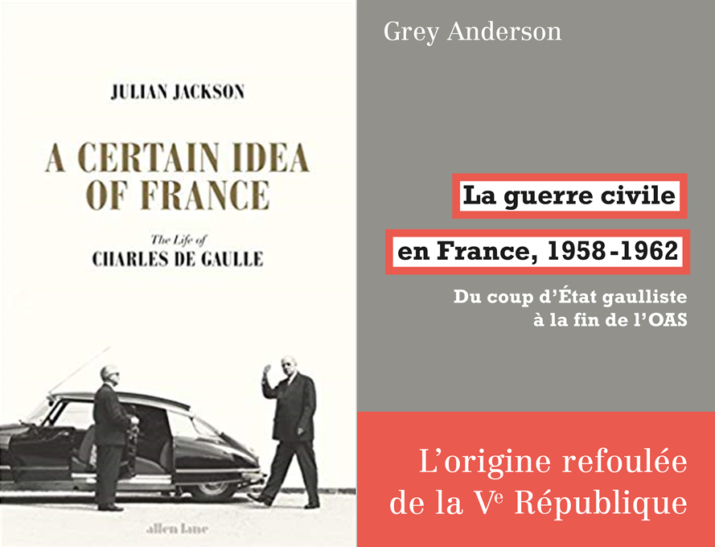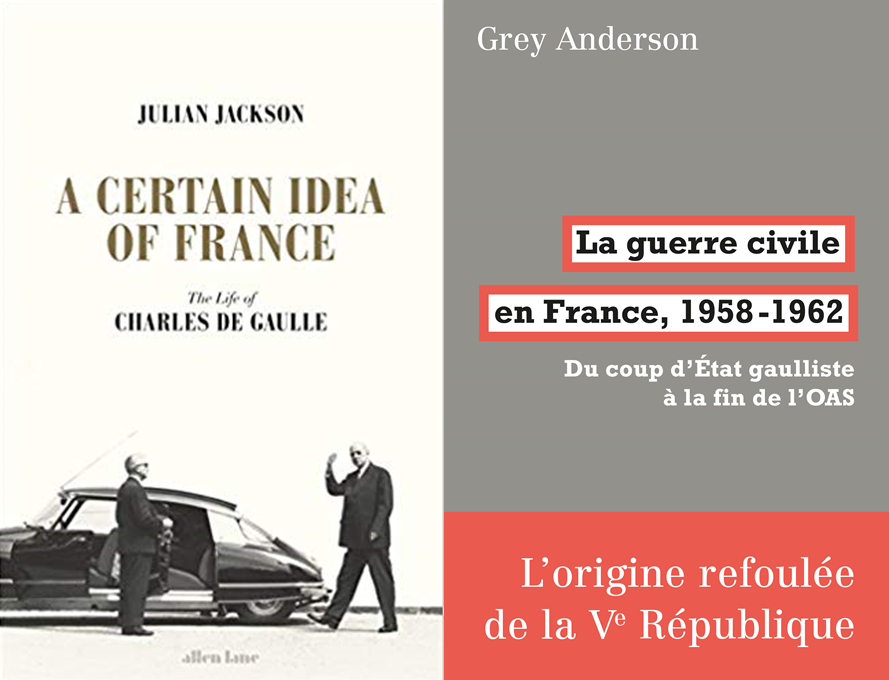
A Certain Idea of France: The Life of Charles de Gaulle by Julian Jackson & La guerre civile en France, 1958-1962 by Grey Anderson

To call someone a Machiavellian is to point to a political and tactical acumen tempered by subtle cunning or expediency, even ruthlessness. But it is often forgotten that it was not so much for the prince that Machiavelli wrote his eponymous treatise as the new prince. Which is to say, the ruler whose right to rule has only recently been asserted and remains flimsy, questionable, and contested—the arbitrariness and underlying force of which have no recourse to tradition. Nor have they been naturalized by the passing of time. Both Julian Jackson’s and Grey Anderson’s work point to the equivalent recurring task for Charles de Gaulle, and in doing so lay out key political logics, values, and calculations guiding de Gaulle’s career. They also manage, in different ways, to make weighty contributions to a richer picture of the France that the General did so much to shape.
Jackson’s biography illuminates de Gaulle’s repeated trials to establish his authority in similar vein: as leader of the Free French during the Second World War, in the reconstituted post-war Fourth Republic, in his return to power in 1958, and in his reiteration of his claim to legitimacy in response to the student and worker challenge of 1968. A recurring theme in Jackson’s account is the question of the appropriate relationship between political and military realms that would absorb de Gaulle throughout his career. Modernization of the army was a constant in his thought, but it was modernization of a very specific sort, whereby the army knew its place within a broader rational organization of society. France, de Gaulle averred, was not the land of pronunciamentos. De Gaulle’s chameleon-like quality to appear variously as modernizer and reactionary throwback would cause confusion throughout his life, and was something he would play on to his advantage.
De Gaulle made a name for himself by refusing France’s armistice with Nazi Germany, instead setting up base in London in June 1940. His answer to the questions posed by his presumption to establish and lead a dissident representative body of the French nation was his legendary broadcast from the BBC on June 18, calling on the French to continue the struggle. As Jackson explains, “all de Gaulle’s future action—what he would later call his ‘legitimacy’ – derived from that moment. His was the first public voice to oppose the idea of an armistice in France, and he offered not merely a moral appeal but an argument explaining why all was not lost” (128). The retrospective mythologization of the June 18 address obscures de Gaulle’s lack of authority at that moment to make such an audacious move. Pétain was not yet the collaborationist traitor but still the hero of Verdun, widely held to be an honest patriot without political ambitions. Conversely, soldiers launching themselves into politics were distrusted; de Gaulle was not yet “de Gaulle.”
Jackson’s work is particularly useful in dismantling retrospective accounts of the nature and cohesiveness of the forces that de Gaulle set out to lead. Quite dissonant with Gaullist mythology are the doubts many of the Free French had about de Gaulle’s commitment to democracy and the Republic. It was only with the emergence of the internal Resistance in France that he put aside his famed calculated ambiguity and came to champion these overtly. He also flirted and then dispensed with calls for “revolution” in his staking out and consolidating his power, judiciously pre-empting rival— primarily Communist—machinations for post-war France.
Machiavelli tells the new prince that fortune counts for as much as talent, and de Gaulle was himself lucky that he obtained British government support by default when all its attempts to find another solution through alternative Generals in the French empire had failed. And the Machiavellian de Gaulle comes into full view in Jackson’s detailing of the fractiousness and tensions that characterized the General’s relations with his interlocutors during the war. Even relations with Churchill’s wartime government that harbored him were continually strained as a result of constant maneuvering and jockeying for France’s and—above all—his own position. But in garnering sufficient forces for his alternative institutionalization of French state authority and grandeur, de Gaulle had plenty of talent to draw on as well, especially in “his capacity to ‘create an event’—his showman’s instinct to force himself on the attention of those who wanted to ignore him” (207).
Gradually, de Gaulle shored up his authority over the Free French in London, while his ongoing broadcasts from the BBC crystallized a myth of de Gaulle among his clandestine French audiences. Similarly, Free French successes, particularly in the French African empire, re-positioned the General as a figure in control of swathes of important territory rather than just, as critics supposed, a “squatter on the banks of the Thames” (151). In the meantime, illusions about Pétain had been dispelled both within and without France while de Gaulle outmaneuvered all other pretenders. As anti-Pétainist French factions congregated in Algeria, de Gaulle easily swallowed up his chief rival, General Giraud, establishing himself as point man to secure France a frontline role in the impending Allied victory, and with it a post-war seat among the foremost international powers.
Jackson emphasizes the importance of the question of how de Gaulle would be received in France after four years of exile. De Gaulle famously enacted the role of the new prince in his entrance to Paris on August 24, 1944: “every step that he took during the remainder of the day was meticulously calculated” (325). Georges Bidault, President of the National Council of the Resistance, asked de Gaulle if he would now declare that the Republic was restored. De Gaulle’s curt reply expressed the thought behind every action he had taken since arriving in Paris: “The Republic has never ceased to exist… Vichy was always, and remains, null and void. I am President of the Republic. Why should I proclaim it?” (327). De Gaulle’s famous walkabout among the crowds of the Champs-Elysées the following day likewise served as a performative enactment of his national leadership.
Like Churchill in the UK, however, de Gaulle’s wartime capital did not transfer undiminished into the new post-war world. Jackson highlights how a recurring Gaullist stratagem was to present himself as the only buffer between France and catastrophe. While there was mileage to be had in this in the first two years of the post-war period with faltering domestic reconstruction and uncertain forecasts of international relations, the impending sense of catastrophe that had hovered over French politics began to dissipate, and with it the prospect of de Gaulle’s return to power: “The ‘system’ had held out” (406). De Gaulle’s star would not rise again until the Fourth Republic sank into the morass of the Algerian war of independence from November 1954.
Successive short-lived governments escalated this paradigmatic war of European decolonization without any corresponding prospects of resolution. When, in 1958, the anger of the “pieds noirs” European settler community in North Africa coalesced with the discontent of the French army, the Fourth Republic entered a terminal crisis. De Gaulle stepped into the breach and “felt in a strong enough position to declare not only that he would not appear before parliament but also that he wanted full powers for a year to draft a new constitution” (468). Jackson argues that de Gaulle was not restricted to the option of coming back to power on the back of the army in this way. Plausibly, he could have publicly condemned the army’s dissidence and rallied a robust political coalition. In this scenario, an army coup would have been short-circuited through a lack of any other plausible candidate to front its operation. But de Gaulle was playing for high stakes: “He wanted to come back on his terms: to break the system, not enter it” (473). The trade-off was that he created a dangerous precedent, reinforcing the army’s conviction that it could bend Paris to its will—the upshot of which would be its role in the “week of the barricades” in January 1960, and the Generals’ putsch in April 1961.
Regarding his plans for Algeria, historians have expended enormous amounts of ink trying to parse out de Gaulle’s intentions from his deliberately ambiguous and changeable discourse. Jackson rejects the more hagiographical accounts of de Gaulle that see him as a skillful visionary, treading deftly through the minefields of the claims of the pieds noirs, the army and Algérie française diehards, to deliver a modernizing, decolonized France. For Jackson, the problem of control of the army and international pressure moved de Gaulle towards negotiations with the Algerian National Liberation Front (FLN). Both factors touched Gaullist nerves: the idea of a modernizing state with the subduing of factions and a proper relationship between executive power and the army, and the importance of grandeur whereby France necessarily merited a premier rank among the nations in the exertion of its genius on a global scale. Ultimately, this vision of the French state trumped colonial attachments.
Jackson recognizes de Gaulle’s political acumen without slipping into an overblown portrayal of the power he yielded, again pointing to de Gaulle’s luck in besting his opponents when his own ambiguity left the field open to the extremes. Likewise, he foregrounds de Gaulle’s own sense of his limitations, as when he remarked to one politician in 1958 that “the most common error of all statesmen is to believe firmly that there exists at any one moment a solution to every problem. There are in some periods problems to which no solution exists” (515). Fortune and realistic gauging of the balance of forces are, after all though, fundamental characteristics of Machiavelli’s new prince, too.
Several reactions to Anderson’s work, La guerre civile en France, 1958-1962, have framed it as an exploration of the hidden origins of today’s Fifth Republic. However, this is not the kind of revisionist work that promises to dynamite existing scholarship but turns out to be little more than pyrotechnics. It is rather a subtle but revelatory refocusing of the historian’s lens through careful reconstruction of historical detail coupled with an incisive grasp of the structures, antagonisms and permutations at the heart of post-war French power. There is a Gramscian quality to the kinds of questions Anderson poses in his sophisticated interrogation of the interrelations between the state apparatus and civil society in their broadest instantiations. But it is one of the most impressive achievements of this book that this subterranean theoretical dexterity elucidates rather than corrals the complexities of the French Fourth Republic from around 1950 to the consolidation of the Gaullist regime post-1962.
Anderson also cites Machiavelli in an opening epigraph, but in this reading the problem of the new prince can be understood in the concept of neutralization. In turn neutralization is historically contextualized in the prevalent atmosphere of civil war and contestations over modernization. Indeed, a foremost contribution of this work is its explication of the delinking of the Gaullist regime from its controversial origins. Tellingly, last year President Macron chose to celebrate the sixtieth anniversary of the 5th Republic in October – the date of the promulgation of its constitution. Anderson, conversely, homes in on May 13, 1958. On the back of the coup in the streets of Algiers by European settlers and army officers on this day, de Gaulle made himself available as a providential savior. Naturally, he made his return conditional on being granted strong executive powers and constitutional reforms.
Nonetheless, violent contestations and talk of putsch and pronunciamento dominated the summer of 1958. What has been insufficiently explored, for Anderson, is how this soon came to be forgotten and occulted to a remarkable degree. He quotes Jean-Paul Sartre’s September 1958 intervention where he confidently predicted that “the Gaullist regime, up to its end, in all its manifestations, will smell of the arbitrariness and the violence from which it came” (151). That it in fact did not could already be gleaned in an audacious re-narrativization of this sequence of events when de Gaulle spoke to the nation on TV at the war’s end on 8 June 1962. As Anderson describes it, de Gaulle “in a single move rendered capitulation before the FLN a French victory, and presented his return to power, undertaken under threat of a military coup d’état organized in connivance with him and coordinated by his close associates, as the failure of an “enterprise of subversion.” Not only did the regime find itself dissociated from its origins on the streets of Algiers, but it explicitly defined itself against them” (306).
The consolidation of Gaullist hegemony from 1962 depended in large part on foreclosing the analogies made between de Gaulle’s May 1958 assumption of power and justifications for subsequent anti-Gaullist insurrections. Anderson argues that the trials of officers responsible for the 1961 putsch were especially useful as “techniques of neutralization.” Even if the sentences meted out were lighter than de Gaulle wanted, their framing defused “the virulent contestation of the legitimacy of the new order, and in particular its origins,” and redefined the issues in terms of constitutional interpretation and resistance to progress (304).
How, then, did the Gaullist neutralization draw oxygen from the climate of civil war? From the early 1950s, de Gaulle cultivated an image of himself as a prophet in the wilderness, someone who had withdrawn from politics to write his war memoirs. Anderson draws out how, on the contrary, de Gaulle and his associates coveted a return to power, but understood that only with a crisis was there a realistic chance of doing so. The crisis that did emerge in 1958 was experienced in large part in the idiom of civil war. Political parties were cowed by the threat of civil war posed by the Communists, who in turn feared the overtly politicized army and “the men of civil war”. The politicization and assertiveness of the army—forged in the context of the mooted European Defense Community and successive colonial retreats—was itself wedded to the emergent notion of a global civil war. All of which is to say that the prevailing sense of the exhaustion of the Fourth Republic, and the sense that its civil war-style antagonisms could not be contained within its norms and institutions, afforded de Gaulle leeway for appropriation of powers that would otherwise have been unavailable.
Anderson’s focus on civil war also allows him to bring, under a single lens, events that have tended to be discounted from the Gaullist record, notably the police killings of up to two-hundred unarmed Algerian demonstrators in Paris on October 17, 1961, and of nine protestors by the Paris metro stop of Charonne in February 1962. While not explicitly sanctioned by de Gaulle, the upsurge of violence in the Paris police was a predictable and logical outcome of the concession of prerogatives to the security forces. Fearing their morale and loyalty would be eroded given the drift of policy towards Algerian independence, this was in effect a sop to assure their readiness for the government’s crackdown on the left and the diehard pro-French Algeria terrorist OAS.
Anderson traces the extent to which public discourse in the late stages of the Algerian war was marked by contested historical analogies and implicit philosophies of history. One prominent point of dispute was the notion of modernization. De Gaulle successfully leveraged this into his project of neutralization. In part this had to do with the mistaken characterization of both the army and de Gaulle by their opponents. In taxing them variously with fascism or hidebound colonialism, the left as a whole was wrongfooted in understanding and thereby opposing their operative logics.
In fact, in different ways, both the army and de Gaulle were consumed by modernization. The underlying presupposition of their critics that objectionable politics were a priori unamenable to modernization meant that de Gaulle had enormous political capital to yield if he were successfully to present his accession under that rationale. Accordingly, de Gaulle invested heavily in just such rhetoric, in a stroke blunting critiques from the left and de-contesting his modernization at the expense of the army’s alternative vision of playing a leading role in the reconstitution of French Algeria. If the French military expended great energies thinking about modernization in this period, de Gaulle nonetheless successfully turned on it to characterize it as antiquated and blimpish. In his rendering, the Generals’ “pronunciamento” would be ridiculous were it not so disastrous for the nation. Contemptuously dismissed on national TV as “a handful of retired generals,” they were better suited for the armchair while he got on with modernizing France in line with an army in a proper relation to the executive, and integrated into a new framework based on technology and France’s standing as a nuclear power. Anderson stresses the irony that de Gaulle presented the most authoritarian aspects of his accession to power precisely in the language of modernization—the arrogation of arbitrary authoritarian powers, notably in the emergency powers law in article 16, and the rebranding of the longstanding French Republican fears of personal power subduing parliament as the cutting edge of political constitution making.
Jackson notes that de Gaulle’s death in November 1970 “was one of the most intense moments of collective emotion in the history of modern France” (763). By way of illustration, he points to a famous cartoon from the time in the daily Le Figaro showing a huge uprooted oak with a weeping Marianne at its side. Jackson’s biography certainly does not shrink from giving the General and his political talents their due, but neither is he interested in rehashing these kinds of official pieties, and nor does he flinch from examining de Gaulle’s limitations, failures and weaknesses. Nonetheless, it is striking that Jackson and Anderson conclude their respective works with divergent evaluations of the Fifth Republic that de Gaulle bequeathed. For Jackson, its constitution, forged through de Gaulle’s way of exercising power between 1958 and 1969, was “his most lasting achievement” (774). He concedes that it has certain dysfunctional characteristics, notably in terms of the concentration of power in the hands of the President. But ultimately de Gaulle, for the first time in 150 years, created a consensus about the nature of France’s political institutions.
Anderson’s final word, on the other hand, contends that today’s French Republic remains deeply marked by its troubled and repressed beginnings: “Anti-democratic constitutional mechanisms, an authoritarian presidency and a militaristic foreign policy—particularly in its postcolonial African domain—are among the legacies of the ‘transition’ of 1958” (313). What is more, the shadow cast on debates on immigration and “integration” by colonization and wars of independence, a default preference for military expedition in recent years in Africa and the Middle East, and the resurrection of the state of emergency after the terrorist attacks of November 2015, are all, in his view, connected to a significant extent to the legacy of Gaullist neutralization.
Part of the difference in emphasis in Jackson’s and Anderson’s respective conclusions can be put down to legitimate differences of historical interpretation and political judgement. But perhaps it is also a question of form. An advantage of the political biography at its best, as in this instance, is that it excels in illuminating the contingent and the constant in a political life, and historicizes shifting conjugations of an array of personal characteristics. In this case, Jackson sums up the hallmarks of de Gaulle’s career as a whole as: “the tensions between restraint and hubris, reason and sentiment, classicism and romanticism, calculation and provocation, cunning and showmanship, politique and mystique […] Corneille and Chateaubriand, Descartes and Bergson” (773). On the other hand, perhaps the lens of a biography yields a hazier focus on those logics of power which are not reducible to a single individual but in which he or she is imbricated. Here Anderson’s sophisticated dissection of state and civil society convincingly offers up a more pessimistic reading of the nascent Gaullist regime and its afterlives, which insists to a greater degree on the mutual interconnections of post-war colonialism and economic and social modernization.
These divergent but mutually enlightening takes on the Gaullist reinterpretation of Machiavelli’s new prince thus end on different notes. Jackson emphasizes the de Gaulle who established himself as leader of the Free French in June 1940 as resonating still today as a man who saved France’s honor. Anderson’s perspective on the Gaullist regime from its installation in May 1958 onwards, on the other hand, discloses the instrumentalization, occulting and generation of authoritarianism and violence, so that France’s honor depends on their neutralization.
Reviewed by Hugh McDonnell
La guerre civile en France, 1958-1962. Du coup d’Etat gaulliste à la fin de l’OAS
By Grey Anderson
Publisher: La Fabrique
Paperback / 368 pages / 2018
ISBN: 9782358721677
A Certain Idea of France: The Life of Charles de Gaulle
By Julian Jackson
Publisher: Allen Lane
Hardcover / 928 pages / 2018
ISBN: 9781846143519
To read more book reviews click here.
Published on April 2, 2019.




